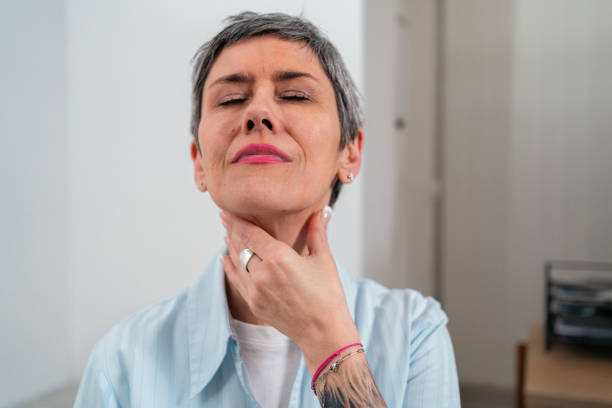Contents
1.sore throat after tattoo

Sore throat after tattooing can catch you off guard, leaving you wondering why your throat feels scratchy or painful after getting some fresh ink. The answer lies in the complex reaction your body undergoes during and after the tattooing process.
Firstly, when you get a tattoo, your body perceives it as an injury. This triggers your immune system, the body’s defense mechanism to kick into high gear. Your immune system’s job is to protect you from harmful invaders like bacteria or viruses. So, when the tattoo needle penetrates your skin, your immune system sees it as a threat and responds by launching an inflammatory response. This inflammation can extend beyond the tattoo site, affecting nearby tissues, including the throat.
Moreover, the tattooing process involves puncturing the skin multiple times with needles. If the tattooing equipment or environment isn’t adequately sanitized, it increases the risk of introducing bacteria or other pathogens into your body. These germs can find their way into your bloodstream, causing your immune system to mount a defense, which can manifest as a sore throat.
Additionally, certain individuals may have an allergic reaction to the ink or other substances used during the tattooing process. This allergic reaction can trigger inflammation and irritation not only at the tattoo site but also in other parts of the body, including the throat.
Furthermore, factors such as the size and location of the tattoo, as well as individual health conditions, can contribute to the likelihood of experiencing a sore throat after getting inked. For instance, tattoos in areas close to the throat or on sensitive skin may result in more pronounced discomfort.
In essence, a sore throat after tattooing is often a result of your body’s immune response reacting to the perceived injury caused by the tattooing process. It’s a natural reaction as your body works to heal and protect itself. However, taking precautions such as choosing a reputable tattoo artist, ensuring proper hygiene during the tattooing process, and following aftercare instructions can help minimize the risk of experiencing discomfort in your throat after getting tattoo.
2.Causes of sore throat after tattoo

Getting a tattoo is an exciting experience, but for some, it can unexpectedly lead to a sore throat. Understanding why this happens is essential for anyone considering or undergoing the tattooing process. In this article, we explore the causes behind a sore throat after getting a tattoo, including immune responses, pathogen exposure, and allergic reactions. By understanding these factors, individuals can take precautions to minimize discomfort and ensure a smoother tattooing experience.
1.Immune Response
When you get a tattoo, your body perceives it as an injury and mounts an immune response. This response is a natural defense mechanism aimed at protecting your body from potential harm. The tattooing process involves puncturing the skin with needles, which triggers your immune system to launch an inflammatory reaction. This inflammation can extend beyond the tattoo site, affecting nearby tissues, including the throat, and leading to a sore throat sensation.
2. Pathogen Exposure
Tattooing, as an art form, disrupts the skin’s barrier, providing a gateway for bacteria, viruses, and various pathogens to enter. If the tattooing equipment, needles, or environment are not properly sanitized, it increases the risk of introducing harmful microorganisms into your body. These pathogens can enter your bloodstream and trigger an immune response, resulting in symptoms such as a sore throat.
3. Allergic Reactions
Some individuals may experience allergic reactions to the ink or other substances used during the tattooing process. Tattoo inks often contain various ingredients, such as metals, dyes, or preservatives, which can elicit allergic responses in susceptible individuals. When exposed to these allergens, the immune system reacts by releasing chemicals that cause inflammation and irritation. This allergic reaction can manifest not only at the tattoo site but also in other parts of the body, including the throat, leading to soreness and discomfort.
4.Size and Location of the Tattoo
The size and location of the tattoo can also influence the likelihood of experiencing a sore throat afterward. Tattoos located near the throat or on sensitive areas of the body may result in more pronounced discomfort due to the proximity to delicate tissues and nerve endings. Additionally, larger tattoos may involve more extensive trauma to the skin, increasing the immune response and the risk of experiencing symptoms such as a sore throat.
Understanding these potential causes can help individuals better prepare for the tattooing process and take necessary precautions to minimize the risk of developing a sore throat after tattoo. It’s essential to choose a reputable tattoo artist, ensure proper hygiene and sanitation practices are followed during the tattooing procedure, and be vigilant for any signs of infection or allergic reactions. If you experience persistent or severe symptoms such as a sore throat after tattoo, it’s important to seek medical attention promptly to rule out any underlying complications and receive appropriate treatment.
3.Symptoms and signs of sore throat after tattoo

Experiencing a sore throat after tattooing can catch many individuals off guard. Despite the excitement surrounding the tattooing process, some may find themselves facing unexpected discomfort. This phenomenon, known as a sore throat after tattoo, is not uncommon and can be attributed to various factors. Understanding the symptoms and signs associated with a sore throat after tattooing is crucial for anyone considering or undergoing the process. In this article, we explore these symptoms, including throat pain, swelling, and redness, shedding light on what individuals can expect and how to navigate through this aspect of the tattooing journey. Let’s delve into the telltale signs that might accompany a sore throat after getting inked.
1.Throat Pain
Following the tattooing process, individuals may notice discomfort in their throat, ranging from a mild ache to more pronounced soreness. This discomfort can make swallowing, talking, or even breathing deeply uncomfortable.
2.Scratchy or Irritated Throat
Some individuals may experience a sensation of roughness or scratchiness in their throat after getting a tattoo. This feeling may lead to frequent throat clearing and can be accompanied by a dry or raw sensation.
3.Swelling
Inflammation in the throat tissues can occur as a result of the tattooing process, leading to swelling. This swelling may cause a sensation of tightness or fullness in the throat, making it challenging to swallow or breathe comfortably.
4.Redness
The throat may appear redder than usual due to increased blood flow and immune activity in response to the tattooing process. This redness indicates inflammation in the throat tissues.
5.Difficulty Swallowing
Throat pain and swelling can make swallowing food or liquids difficult. Individuals may experience discomfort or pain with each swallow, and in severe cases, swallowing may become extremely painful or nearly impossible.
6.Hoarseness
Irritation or inflammation of the throat can affect the vocal cords, leading to changes in voice quality. The voice may sound rough, raspy, or strained, and individuals may find it difficult to speak loudly or clearly.
7.Fever
If the body’s immune system mounts a response to the tattooing process, individuals may develop a fever. This fever is the body’s natural response to inflammation or infection and may be accompanied by other symptoms such as chills or sweating.
8.Enlarged Lymph Nodes
Swelling of the lymph nodes in the neck may occur as the body’s immune system responds to the tattooing process. These swollen lymph nodes indicate that the body is actively fighting off perceived threats introduced during the tattooing process.
9.Pus or Discharge
Signs of infection, such as pus or discharge in the throat or around the tattoo site, may indicate a more serious complication requiring medical attention. Pus is a sign of infection and may be accompanied by worsening pain or other symptoms.
10.General Malaise
Following the tattooing process, individuals may experience a sense of overall discomfort, weakness, or unease. This general malaise may be accompanied by fatigue, body aches, headache, and loss of appetite as the body’s immune system responds to the sore throat and associated inflammation.
It’s crucial for individuals experiencing these symptoms after getting a tattoo to closely monitor their condition and seek medical attention if symptoms persist or worsen. By recognizing these signs and seeking prompt medical care, individuals can address any underlying issues and ensure proper treatment and recovery.
4.Risk Factors for sore throat after tattoo

Getting a tattoo is a decision filled with excitement and anticipation, but for some, it may unexpectedly lead to discomfort, including a sore throat after tattoo. Understanding the risk factors associated with this phenomenon is crucial for anyone considering or undergoing the tattooing process. In this discussion, we explore the various factors that may contribute to experiencing a sore throat after tattoo, shedding light on how individuals can navigate these risks and ensure a smoother tattooing experience.
1.Tattoo Placement
The location of the tattoo on the body can influence the risk of experiencing a sore throat after tattoo. Tattoos positioned near the throat or in sensitive areas may heighten discomfort due to their proximity to delicate tissues and nerve endings.
2. Tattoo Size and Complexity
Larger or more intricate tattoos often require longer sessions and more extensive trauma to the skin. This prolonged exposure during the tattooing process can elevate the risk of developing symptoms of a sore throat afterward.
3.Tattooing Technique
The technique employed by the tattoo artist can impact the likelihood of experiencing a sore throat after tattoo. Aggressive or rough techniques may induce greater trauma to the skin and surrounding tissues, leading to heightened inflammation and discomfort in the throat.
4.Preexisting Health Conditions
Individuals with preexisting health conditions, such as respiratory issues or immune system disorders, may be more prone to experiencing symptoms of a sore throat after tattoo. These existing health issues can weaken the body’s ability to heal properly and react well to the tattooing procedure.
5.Poor Tattoo Aftercare
Neglecting proper tattoo aftercare, such as inadequate cleanliness or failure to follow the artist’s instructions, can elevate the risk of complications, including a sore throat after tattoo. Adhering to proper aftercare practices is crucial for minimizing the risk of infection and inflammation.
6.Hygiene Practices
The cleanliness of the tattooing environment and equipment significantly influences the risk of developing a sore throat after tattoo. Subpar hygiene practices, such as using unsterilized needles or contaminated ink, can introduce harmful bacteria or pathogens into the body, heightening the likelihood of throat-related discomfort.
7. Allergic Reactions
Some individuals may experience allergic reactions to tattoo ink or other substances used during the tattooing process, potentially resulting in a sore throat after getting a tattoo.
8.Smoking and Alcohol Consumption
Smoking and excessive alcohol consumption may compromise the body’s immune response and hinder the healing process. Individuals engaging in these habits may face an increased risk of experiencing symptoms of a sore throat after tattoo.
experiencing a sore throat after tattoo can be an unexpected challenge for individuals undergoing the tattooing process. However, by understanding the various risk factors involved, including tattoo placement, size, and aftercare practices, individuals can take proactive steps to minimize the likelihood of developing throat-related discomfort. Choosing a reputable tattoo artist, adhering to proper aftercare guidelines, and prioritizing overall health and hygiene are essential measures in mitigating these risks. By recognizing and addressing potential risk factors, individuals can embark on their tattooing journey with confidence, ensuring a more comfortable and rewarding experience.
5.Prevention Strategies for sore throat after tattoo

When considering a tattoo, it’s essential to be proactive in preventing potential discomfort, including a sore throat after tattoo. One of the most effective prevention strategies is to carefully select the tattoo placement. Opting for areas of the body away from the throat or sensitive regions can reduce the likelihood of experiencing throat-related symptoms following the tattooing process.
Furthermore, individuals can mitigate the risk of developing a sore throat after tattoo by paying attention to the size and complexity of the tattoo. Choosing smaller and less intricate designs may result in shorter tattooing sessions, minimizing the duration of exposure to potential throat irritants. Additionally, discussing concerns with the tattoo artist beforehand and opting for gentler tattooing techniques can help reduce trauma to the skin and surrounding tissues, decreasing the risk of throat inflammation and discomfort.
Another crucial aspect of prevention is maintaining proper tattoo aftercare. Following the artist’s instructions for cleaning and moisturizing the tattooed area is essential for promoting healing and minimizing the risk of infection. Additionally, avoiding behaviors that can compromise the immune system, such as smoking and excessive alcohol consumption, can further reduce the likelihood of developing a sore throat after tattoo.
Ensuring a clean and hygienic tattooing environment is paramount in preventing throat-related symptoms after getting inked. Choosing a reputable tattoo studio that prioritizes sanitation and sterilization practices can significantly reduce the risk of introducing harmful bacteria or pathogens into the body during the tattooing process. By advocating for proper hygiene practices and confirming the use of sterilized equipment, individuals can enhance their safety and minimize the risk of experiencing throat discomfort after tattoo.
In summary, preventing a sore throat after tattoo involves a combination of thoughtful decision-making, effective communication with the tattoo artist, diligent aftercare practices, and prioritizing hygiene and overall health. By taking proactive measures to minimize potential risks, individuals can enjoy their tattooing experience with greater peace of mind, knowing that they’ve taken steps to safeguard against throat-related discomfort.
6.Homemade Remedies for relieving sore throat after tattoo

Dealing with a sore throat after tattoo can be uncomfortable, but there are several homemade remedies that individuals can try to alleviate their symptoms. One of the most straightforward remedies is to stay hydrated by drinking plenty of fluids. Keeping the throat moist can help soothe irritation and reduce discomfort. Warm beverages such as herbal teas with honey or lemon can be especially soothing for a sore throat after tattoo, providing relief while also offering hydration and comforting warmth.
Gargling with salt water is another effective homemade remedy for relieving sore throat after tattoo. Salt water has natural antibacterial properties that can help reduce inflammation and kill bacteria in the throat. Simply mix a teaspoon of salt into a glass of warm water, gargle the solution for about 30 seconds, and then spit it out. Repeat this several times a day to help alleviate sore throat symptoms after getting a tattoo.
In addition to salt water gargles, individuals can also try soothing throat lozenges or throat sprays to relieve sore throat after tattoo. These over-the-counter remedies can help numb the throat and provide temporary relief from discomfort. Look for products containing ingredients such as menthol, eucalyptus, or benzocaine, which can help soothe irritation and reduce pain associated with a sore throat after tattoo.
Humidifying the air in your home can also help alleviate sore throat symptoms after getting a tattoo. Dry air can exacerbate throat irritation, so using a humidifier to add moisture to the air can help keep the throat hydrated and reduce discomfort. Additionally, taking steamy showers or inhaling steam from a bowl of hot water can provide temporary relief by moistening the throat and loosening mucus.
Lastly, practicing good overall health habits can help support the body’s natural healing process and reduce the severity of sore throat symptoms after tattoo. Getting plenty of rest, eating a balanced diet rich in vitamins and nutrients, and avoiding irritants such as smoke or pollutants can all contribute to faster recovery and improved throat comfort after getting inked.
In conclusion, while a sore throat after tattoo can be unpleasant, there are several homemade remedies that individuals can try to alleviate their symptoms. From staying hydrated and gargling with salt water to using throat lozenges and humidifying the air, these simple remedies can help soothe throat irritation and promote healing after getting inked. By incorporating these homemade remedies into their post-tattoo care routine, individuals can experience greater comfort and relief from sore throat symptoms.
Overview
Experiencing a sore throat after tattooing can be surprising. This discomfort stems from factors like immune responses, pathogen exposure, and allergic reactions. However, with careful attention to tattoo placement, size, and aftercare, individuals can minimize throat-related discomfort. Simple remedies like staying hydrated and gargling with salt water can provide relief. By following these steps, individuals can guarantee a tattooing experience that is smoother and more comfortable.





